Lire Conjugation in All 8 Tenses
Lire in French is one of the most frequently used verbs. The meaning of lire is “to read”.
This article gives you lire conjugations in the most common indicative tenses of the French language, as well as some hints on how you would use them in everyday speech. This article will also help you to learn correct grammar so your speech and communication skills in French become top notch!
Why only the 8 indicative tenses? Because those are the tenses you’ll hear when practicing your French! There are 13 other tenses but they have more to do with mood and intent. On top of that they’re rarely used, so even if you’re an intermediate or advanced French learner then the indicative 8 are ALL you need!
Before you continue: Corrector provides a free tool to help you correct grammar and spelling in any language (including conjugations)! Just click here to access it!
French Tenses for Lire Conjugation
- Présent. Something that is happening now. This can either be ongoing or instant. Eg: I read. / I’m reading.
- Imparfait (imperfect). Used to describe ongoing, continual or habitual past events. Eg: I was reading.
- Passé simple is not common and normally found in formal or literary contexts. If you’re a beginner or even intermediate French learner then you can safely ignore it for now (but it’s still included below for convenience). Eg: I read.
- Passé composé. Widely used to talk about completed past actions. Eg: I read.
- Futur simple (simple future) is used when you intend to describe a general future state of being. Eg: I will read. Once again, beginners can generally ignore this conjugation as there’s a much simpler version (next in list) that will suffice for now.
- Futur proche (near future) describes an upcoming action. In English this would be “I am going to read …“. This should be your go to future tense when learning conjugations.
- Plus-que-parfait (pluperfect). This tense indicates that an action had taken place and was completed before another past action took place. Eg: I read it before eating my meal.
- Passé antérieur is not common at all (just like passé simple), and again is found in formal or literary contexts. Eg: I had read.
- Futur antérieur (future perfect) is used to describe a future action that will be completed in the future before another action is started. For example: I will have read it before eating breakfast.
Mastering lire conjugation in at least 3 tenses (present, passé composé and futur proche is essential for becoming proficient in French. In fact I would concentrate on these 3 and only study the others when they come up in literature or other contexts.
The following tables also give usage examples of lire used in its respective tense.
Lire Présent Conjugation (Present)
Présent definition: The Présent tense is used to describe actions or states that are happening at the current moment or are generally true. It is the most frequently used tense in all languages. Note that French doesn’t have the present continuous verb tense like in English. Hence, “I read” and “I am reading” both translate to je lis.
| Pronoun | Conjugation | English Translation |
|---|---|---|
| Je | lis | I read |
| Tu | lis | You read |
| Il/Elle | lit | He/She reads |
| Nous | lisons | We read |
| Vous | lisez | You read |
| Ils/Elles | lisent | They read |
Example Sentences:
- Je lis beaucoup de livres. (I read a lot of books.)
- Tu lis toujours le journal le matin. (You always read the newspaper in the morning.)
- Elles lisent des romans en français. (They read novels in French.)
Lire Imparfait Conjugation (Imperfect)
Imparfait definition: The Imparfait tense is used to describe ongoing or habitual actions from the past. It is commonly used to set the background for other actions in the past. In everyday French it is used to talk about past events or actions that were ongoing. Imparfait is also used to talk about feelings, attitudes, time & date and the weather. In English you may hear this said as “used to”. Eg: I used to read.
| Pronoun | Conjugation | English Translation |
|---|---|---|
| Je | lisais | I used to read |
| Tu | lisais | You used to read |
| Il/Elle | lisait | He/She used to read |
| Nous | lisions | We used to read |
| Vous | lisiez | You used to read |
| Ils/Elles | lisaient | They used to read |
Example Sentences:
- Je lisais beaucoup quand j’étais enfant. (I used to read a lot when I was a child.)
- Tu lisais toujours avant de dormir. (You used to read before sleeping.)
- Nous lisions des contes le soir. (We used to read stories in the evening.)
Lire Passé Simple Conjugation (Simple Past)
Passé Simple definition: The Passé Simple manger conjugation is primarily used in written literature, especially within narrative texts such as novels, stories, and historical accounts. In everyday spoken language, the Passé Simple is rarely used but you will see it everywhere in the aforementioned literary works. In meaning there is virtually no difference between this tense and the Passé Composé. Eg: I read.
| Pronoun | Conjugation | English Translation |
|---|---|---|
| Je | lus | I read |
| Tu | lus | You read |
| Il/Elle | lut | He/She read |
| Nous | lûmes | We read |
| Vous | lûtes | You read |
| Ils/Elles | lurent | They read |
Example Sentences:
- Je lus ce livre en une seule nuit. (I read this book in a single night.)
- Tu lus les instructions avant de commencer. (You read the instructions before starting.)
- Nous lûmes cette histoire pendant les vacances. (We read this story during the holidays.)
Lire Passé Composé Conjugation (Present Perfect)
Passé Composé definition: The Passé Composé tense is used to talk about completed actions in the past. It is one of the most common past tenses and is frequently used in everyday French language. The key fact you need when deciding to use this tense is to ask if the past action have a start and finish in the past. If yes, then Passé Composé is the tense you need! The literal translation is “I have read” but in English we normally shorten this to “I read“.
| Pronoun | Conjugation | English Translation |
|---|---|---|
| J’ai | lu | I have read |
| Tu as | lu | You have read |
| Il/Elle a | lu | He/She has read |
| Nous avons | lu | We have read |
| Vous avez | lu | You have read |
| Ils/Elles ont | lu | They have read |
Example Sentences:
- J’ai déjà lu ce livre. (I have already read this book.)
- Tu as lu l’article que je t’ai envoyé ? (Have you read the article I sent you?)
- Nous avons lu tous les chapitres hier soir. (We read all the chapters last night.)
Lire Futur Simple Conjugation (Simple Future)
Futur simple definition: The futur simple is used to express an action that will happen in the future. It is commonly used in everyday language when talking about general future plans or intentions. If you find this tense complicated then you can always just use the “aller” form in the next section “futur proche”.
| Pronoun | Conjugation | English Translation |
|---|---|---|
| Je | lirai | I will read |
| Tu | liras | You will read |
| Il/Elle | lira | He/She will read |
| Nous | lirons | We will read |
| Vous | lirez | You will read |
| Ils/Elles | liront | They will read |
Example Sentences:
- Je lirai ce livre demain. (I will read this book tomorrow.)
- Tu liras les instructions avant de commencer. (You will read the instructions before starting.)
- Elles liront ce roman pendant les vacances. (They will read this novel during the holidays.)
Lire Futur Proche Conjugation (Near Future)
Futur Proche definition: This is known as the “going to [read]” future tense. It is used to express actions that are planned or about to happen in the near future. It is very commonly used in everyday spoken French. Technically it is not an official tense but is often listed as one.
| Pronoun | Conjugation | English Translation |
|---|---|---|
| Je | vais lire | I am going to read |
| Tu | vas lire | You are going to read |
| Il/Elle | va lire | He/She is going to read |
| Nous | allons lire | We are going to read |
| Vous | allez lire | You are going to read |
| Ils/Elles | vont lire | They are going to read |
Example Sentences:
- Je vais lire ce livre ce soir. (I am going to read this book tonight.)
- Tu vas lire l’article dès que tu auras le temps. (You are going to read the article as soon as you have time.)
- Nous allons lire cette pièce de théâtre ce week-end. (We are going to read this play over the weekend.)
Lire Plus-que-parfait Conjugation (Pluperfect)
Plus-que-parfait definition: Expresses an action that had happened before some other past action took place. It is commonly used in written language, especially in literature and formal texts.
| Pronoun | Conjugation | English Translation |
|---|---|---|
| J’avais | lu | I had read |
| Tu avais | lu | You had read |
| Il/Elle avait | lu | He/She had read |
| Nous avions | lu | We had read |
| Vous aviez | lu | You had read |
| Ils/Elles avaient | lu | They had read |
Example Sentences:
- J’avais déjà lu ce livre avant le cours. (I had already read this book before the class.)
- Tu avais lu l’article avant la réunion. (You had read the article before the meeting.)
- Nous avions lu le scénario avant le début de la pièce. (We had read the script before the play started.)
Lire Passé Antérieur Conjugation (Past Anterior)
Passé Antérieur definition: This tense is a literary tense used in formal and historical writing. It is similar in meaning to the Plus-que-parfait tense (Pluperfect) but is considered more archaic and is mostly found in classical literature. As a French speaker you will hardly ever (if at all) use this tense!
| Pronoun | Conjugation | English Translation |
|---|---|---|
| J’eus | lu | I had read |
| Tu eus | lu | You had read |
| Il/Elle eut | lu | He/She had read |
| Nous eûmes | lu | We had read |
| Vous eûtes | lu | You had read |
| Ils/Elles eurent | lu | They had read |
Example Sentences:
- J’eus à peine lu le livre qu’il me posa des questions. (I had barely read the book when he started asking me questions.)
- Tu eus déjà lu ce texte avant la classe. (You had already read this text before the class.)
- Nous eûmes lu toutes les instructions avant de commencer. (We had read all the instructions before starting.)
Lire Futur Antérieur Conjugation (Future Perfect)
Futur Antérieur definition: This tense is used to express actions that will have been completed before a specific future point in time. In fact that preceding sentence is an exact example of it, using the phrase “will have been completed”. It is used both in written and spoken language.
| Pronoun | Conjugation | English Translation |
|---|---|---|
| J’aurai | lu | I will have read |
| Tu auras | lu | You will have read |
| Il/Elle aura | lu | He/She will have read |
| Nous aurons | lu | We will have read |
| Vous aurez | lu | You will have read |
| Ils/Elles auront | lu | They will have read |
Example Sentences:
- J’aurai lu ce livre avant la fin de la semaine. (I will have read this book before the end of the week.)
- Tu auras lu tous les chapitres d’ici demain. (You will have read all the chapters by tomorrow.)
- Nous aurons lu toutes les pages de ce livre avant la réunion. (We will have read all the pages of this book before the meeting.)
Lire Conjugation Table Images (FREE to Download)
To download a zip file of all the Lire Conjugations simply click this link. Alternatively click the images below and save individual conjugation tables.
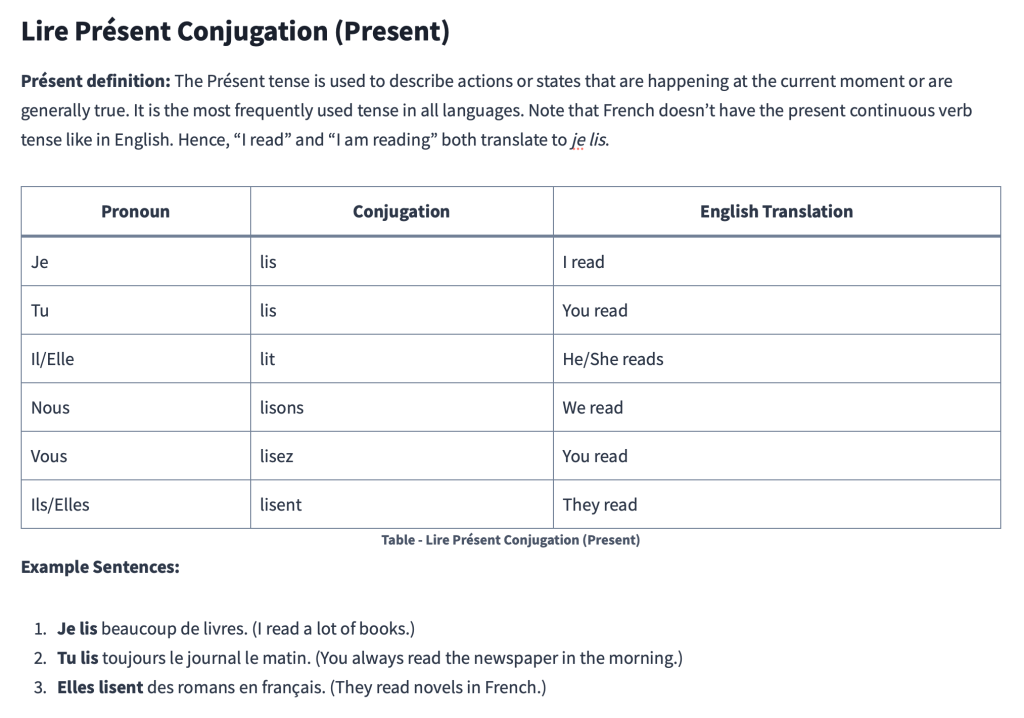
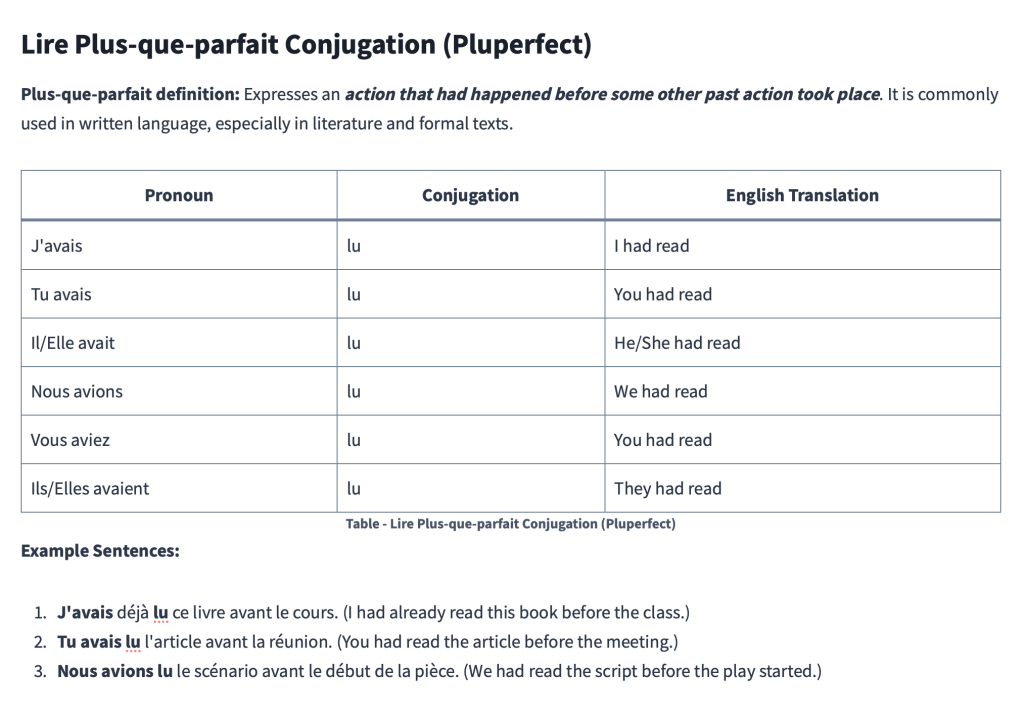
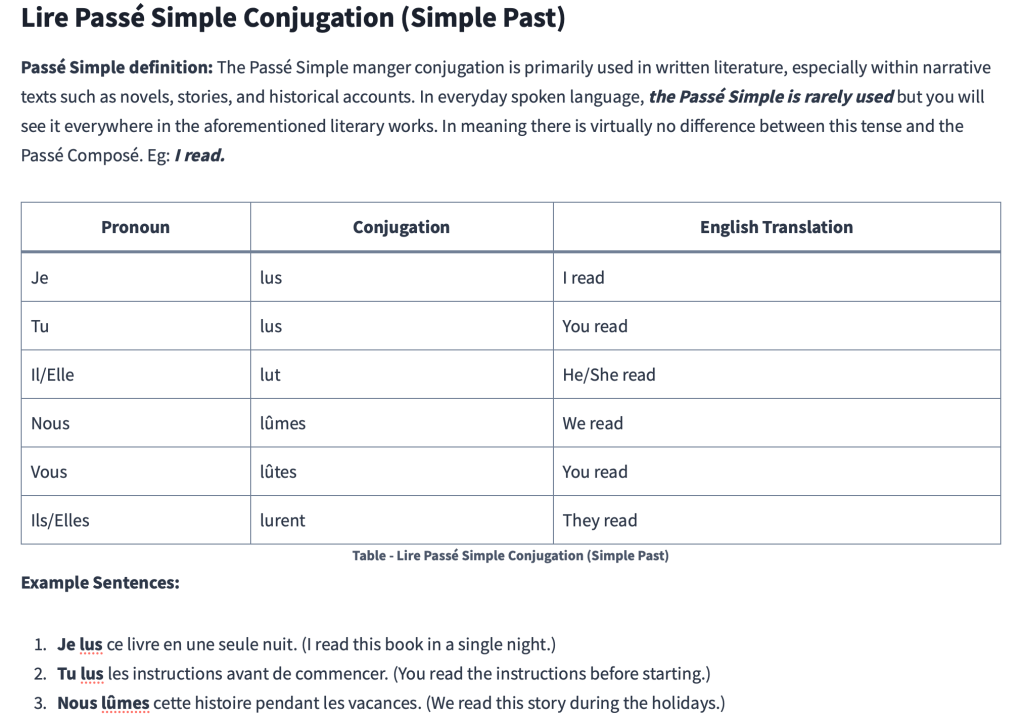
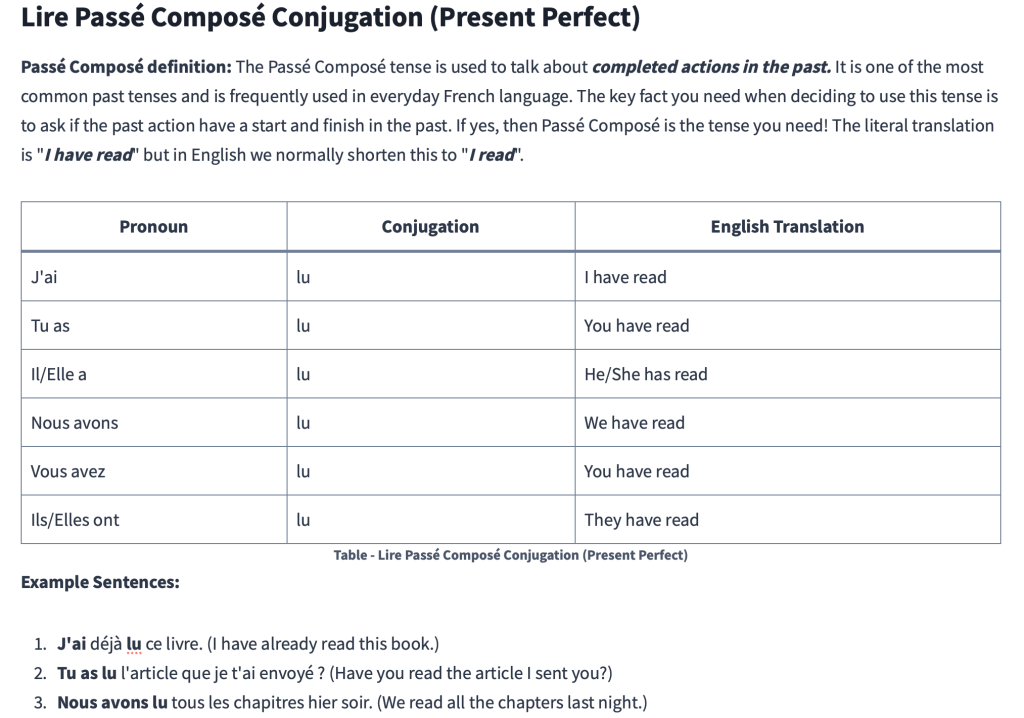
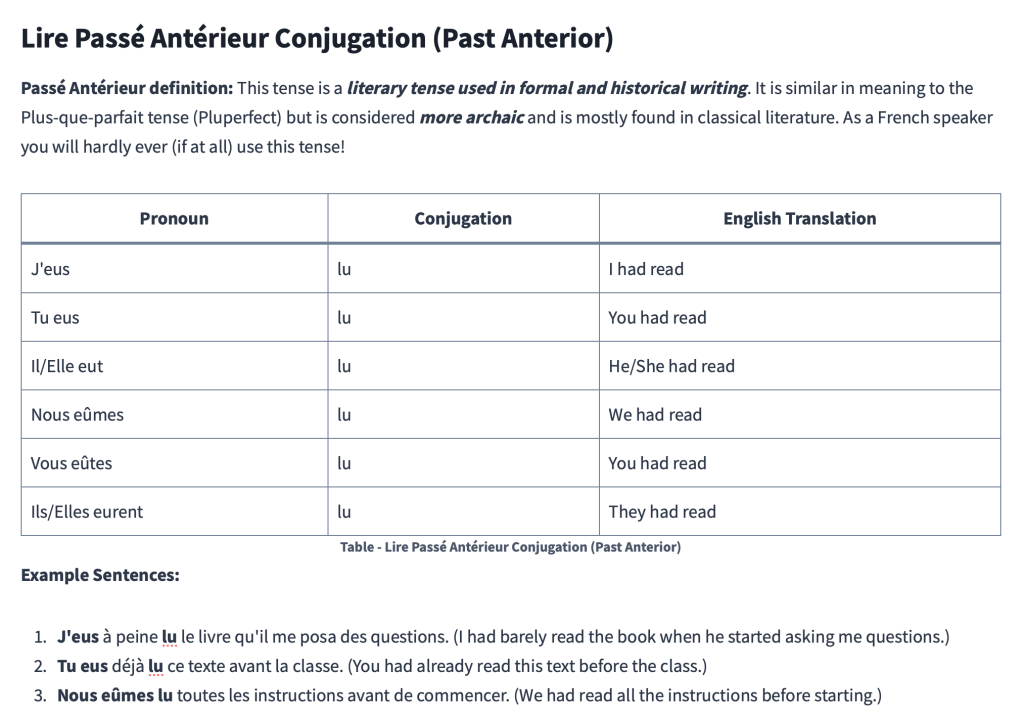
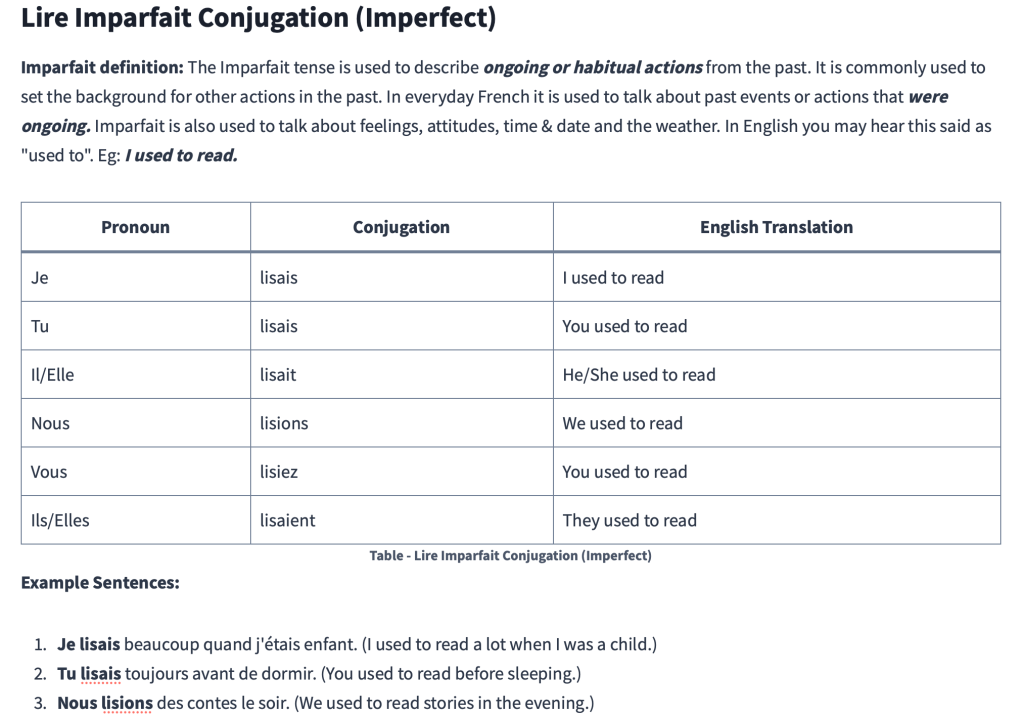
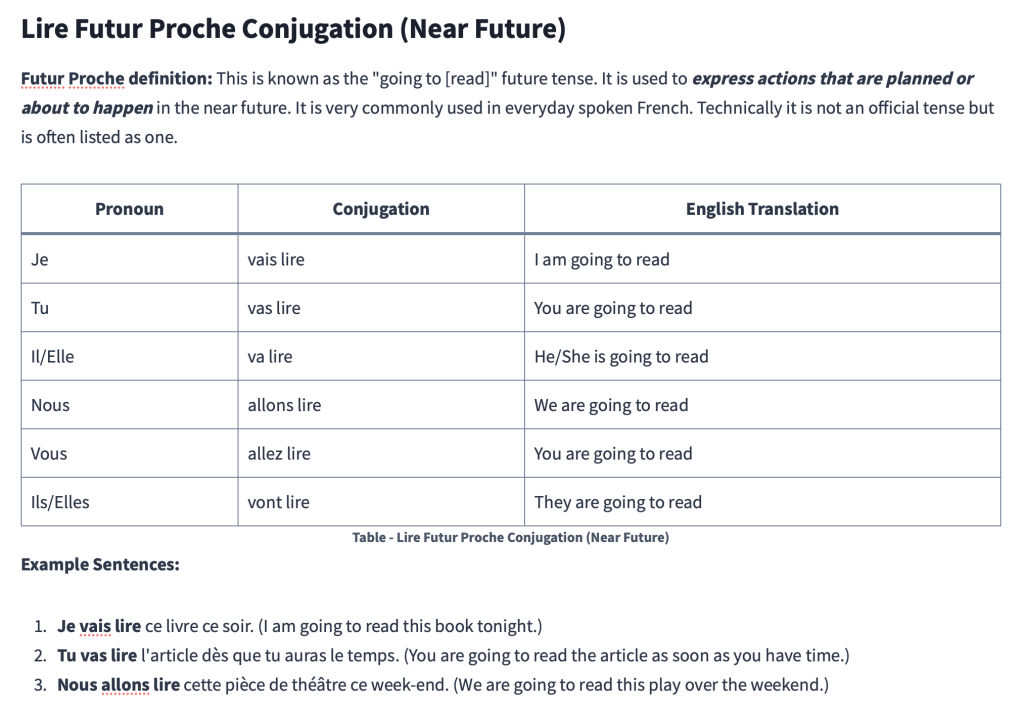
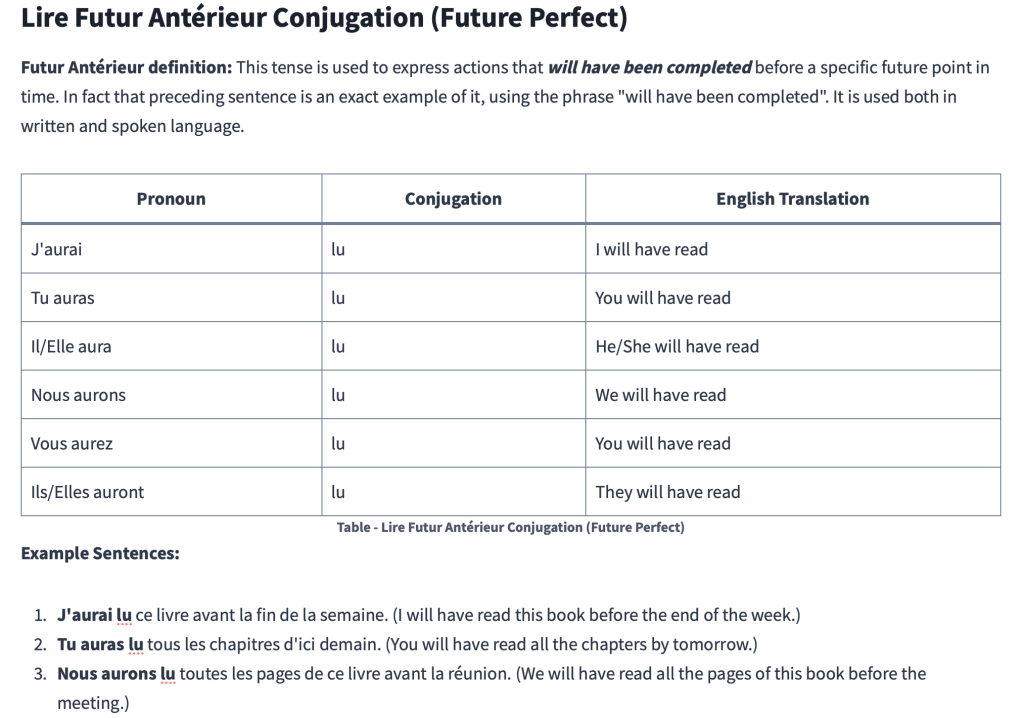
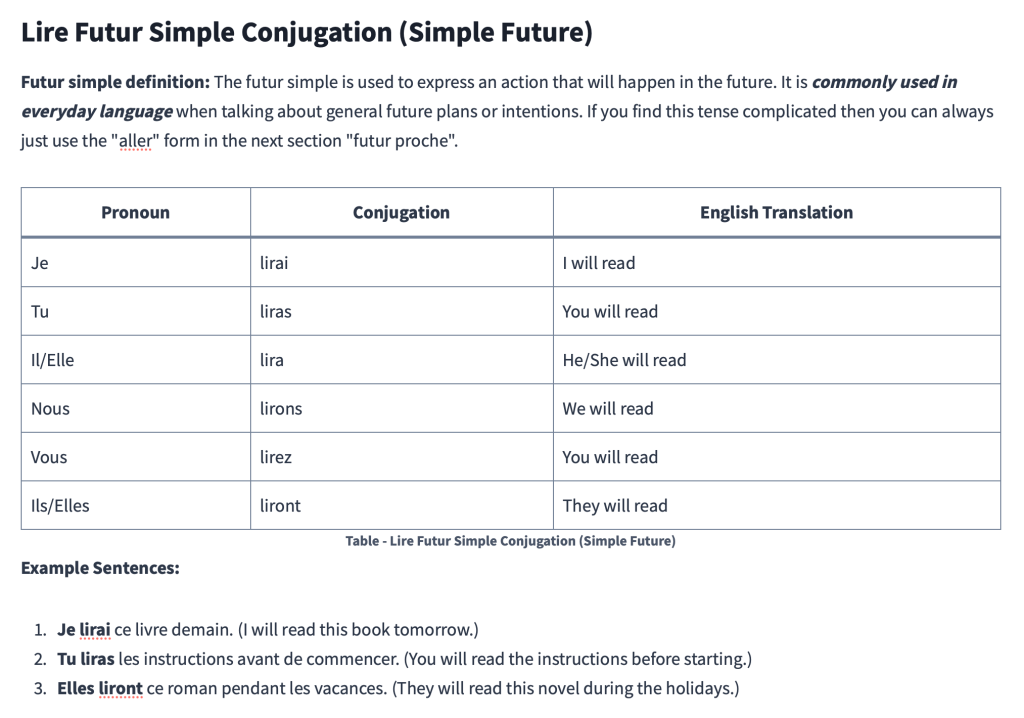
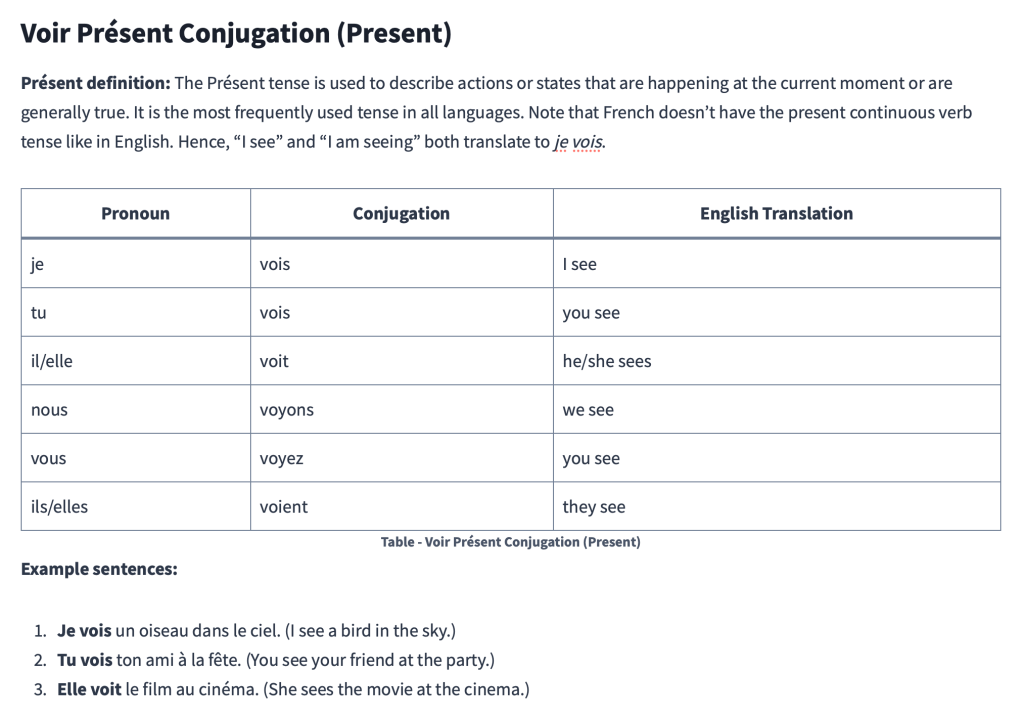
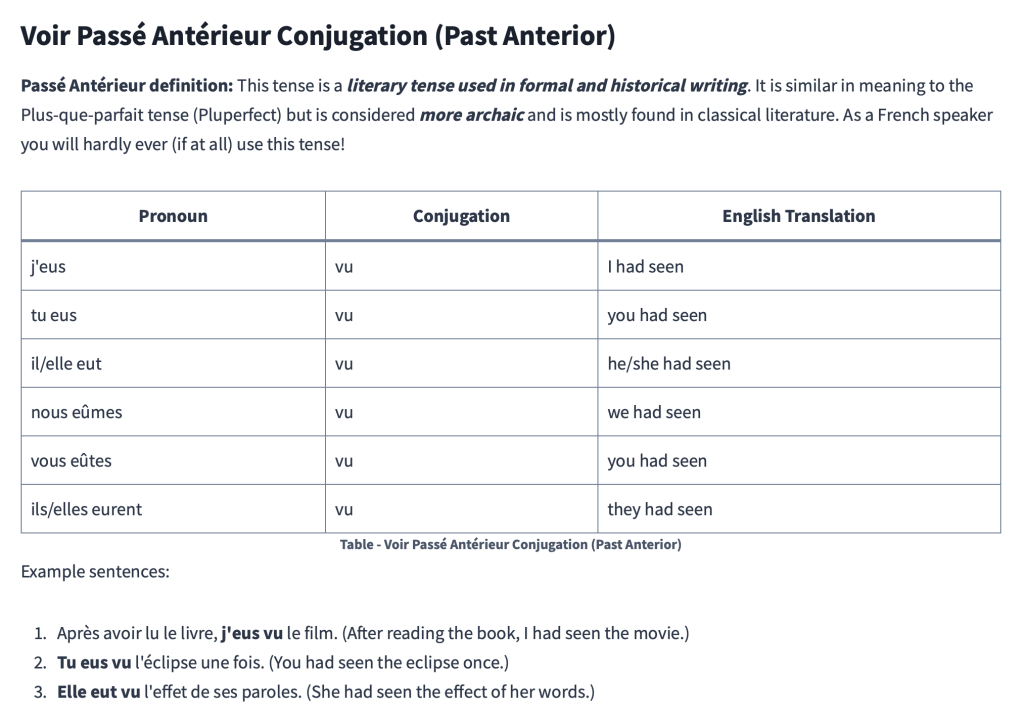
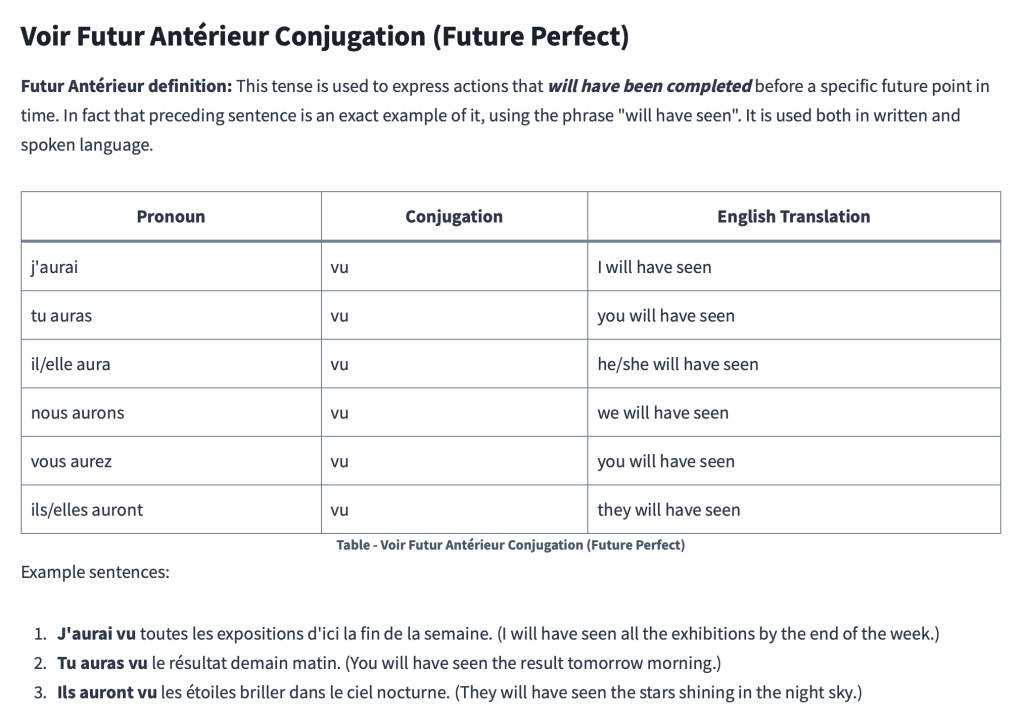
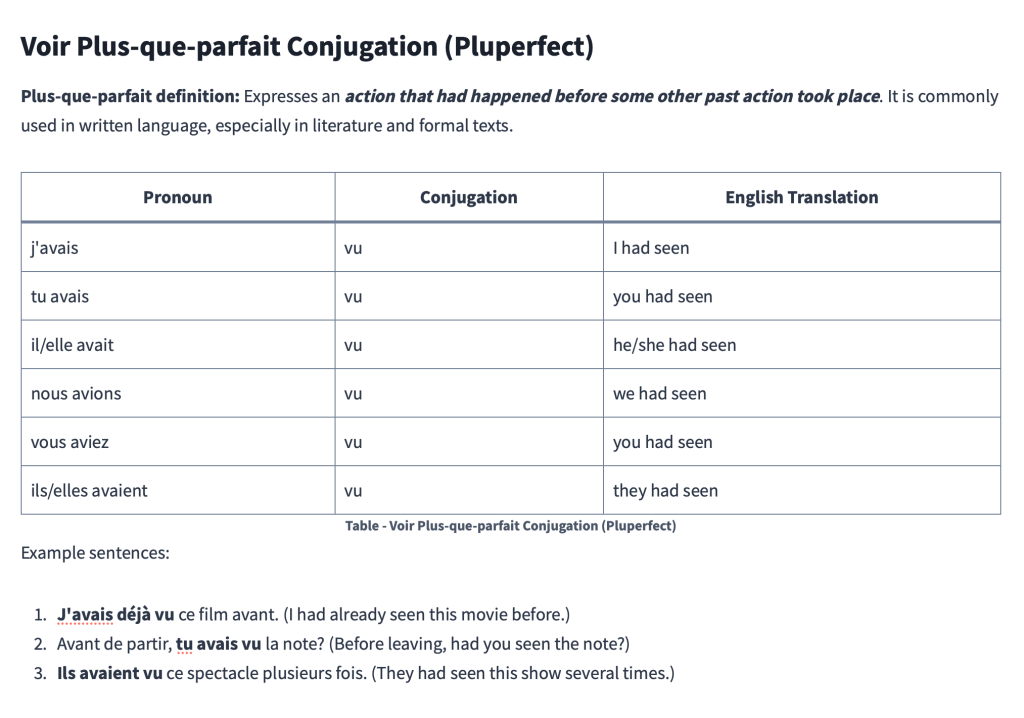
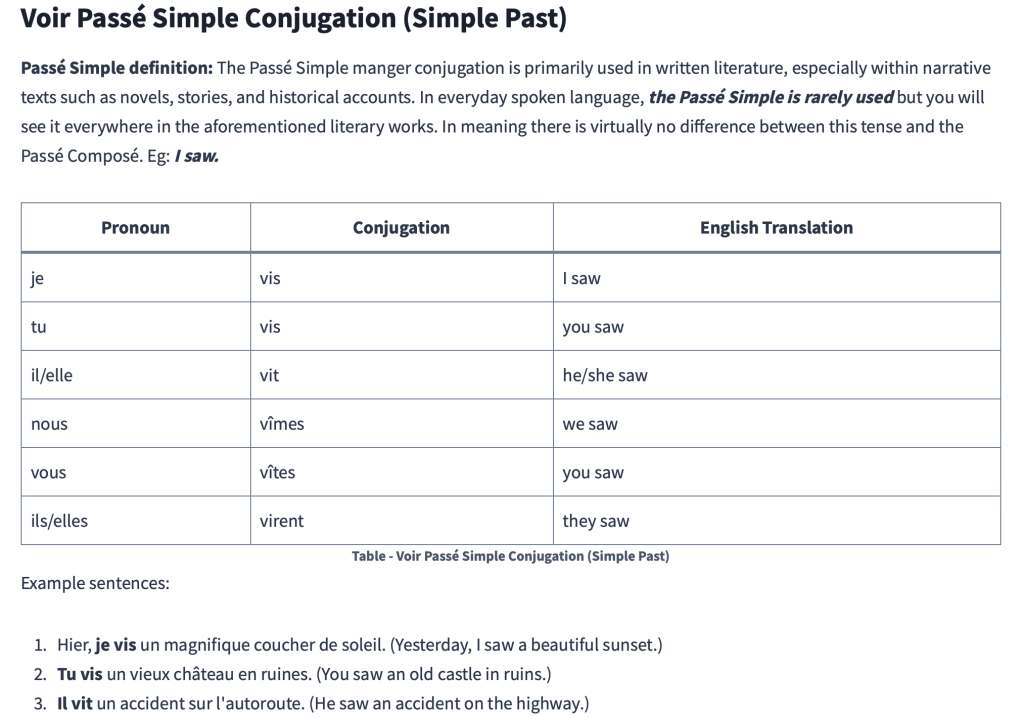
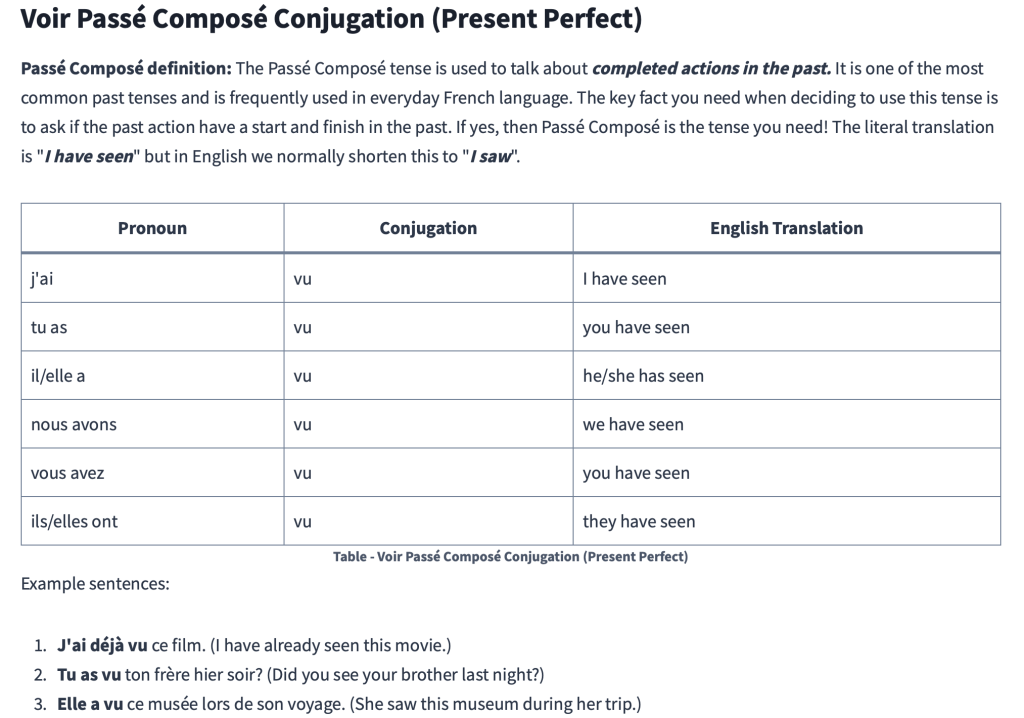
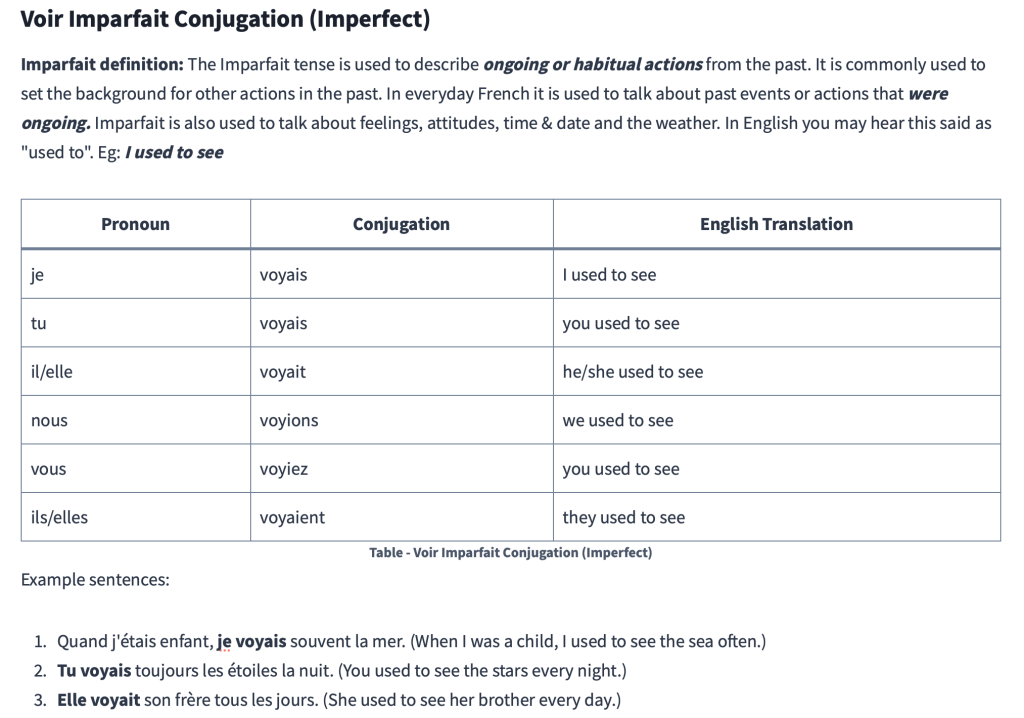
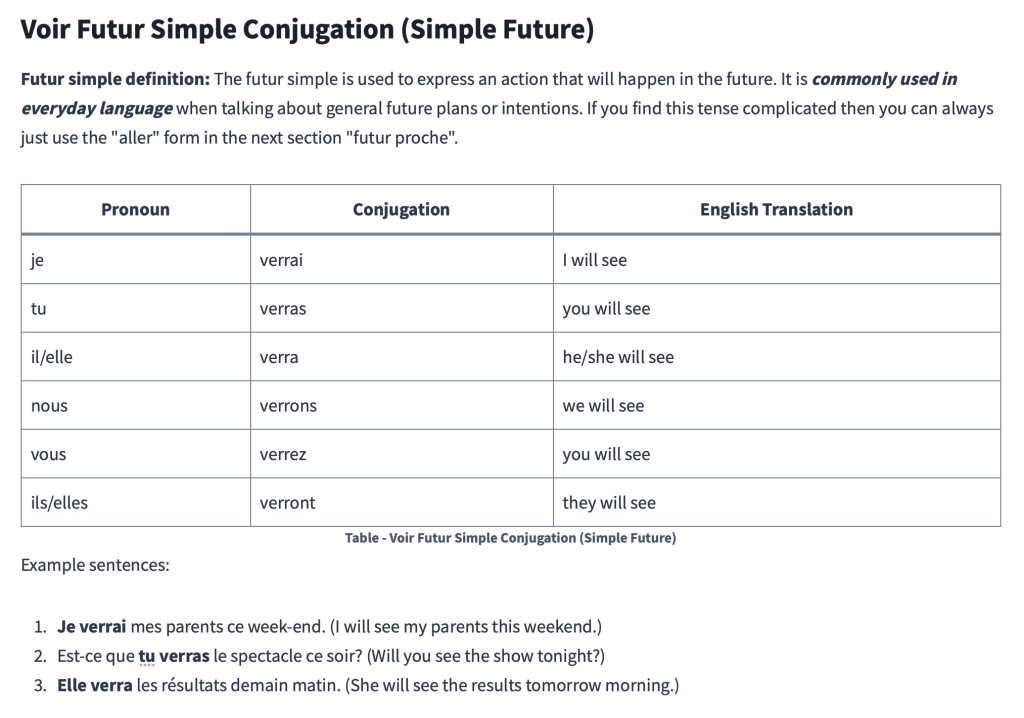
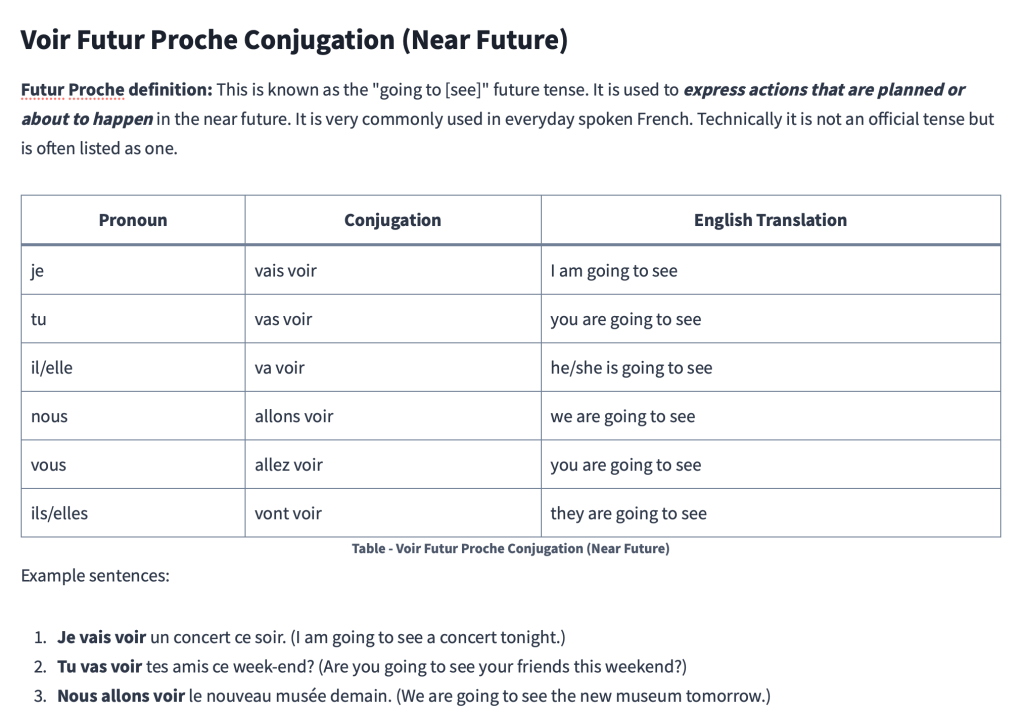
Wrap Up
Lire conjugation isn’t too difficult to learn as long as you stick to present, futur proche and imparfait tenses. You can safely ignore the others for now (but do come back when you’re happily proficient in French).
If you’d like to read more about French verbs, conjugation and tenses then check out this article on how to master French verb conjugations. Lot’s of great tips in there if you’re struggling!
Alternatively let us do the hard work of analysing your French texts by using our free tool! It even picks up lire conjugation mistakes!
Other French Verb Conjugations You May be Interested In
We don’t only have lire conjugations! Here are some others you may want to check out! Also, check out this link which tells you the history of the word “lire”.
